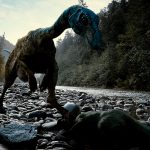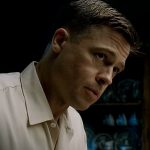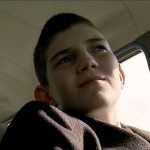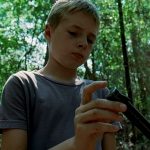The Tree of Life – 2011
I didn’t get this movie. It felt very pretentious and full of itself. It seemed to be self-important and self-indulgent. It was confusing, metaphorical to the point of pointlessness, and took way too long to tell very little story. It boasted two big names, Brad Pitt and Sean Penn. Penn is a really good actor, but in this movie, I couldn’t tell if he was acting the part well or not. I didn’t understand what was going on half the time, or even what the emotional state of his character was supposed to be. Before reading the Wikipedia article, I was not even entirely sure what happened in the plot.
Wikipedia does a fair job of encapsulating the gist of the film when it says, “The film chronicles the origins and meaning of life by way of a middle-aged man’s childhood memories of his family living in 1950s Texas, interspersed with imagery of the origins of the known universe and the inception of life on Earth.” And I must admit that there was some very wonderful cinematography and cool imagery during the sequences in which the origins of life on Earth are shown. But the problem is that it was done in a very confusing and boring way. The shots were visually stimulating, colorful, bafflingly abstract, and slow. Incredibly slow. I don’t think there was much actual slow-motion, but most of the film was simply slow movements and slow action. People often moved as if they were walking in a dream-like, existential haze. And all the while, slow liturgical music was dominating the scene.
The movie seemed to be trying too hard to convey pure emotion, so hard that the emotion was lost. In other words, I couldn’t see the forest for the trees. The movie made heavy use of metaphor and symbolism on a grand scale. The overt religious overtones and philosophical questions slowed things down even more. And then there was the whispering. While images of the forming cosmos rolled across the screen, and soft choral music floated over the picture, every now and then, a whispered word or phrase, which could barely be heard, would creep into the sensual tapestry like a secret prayer.
Very few names were ever given, and the story of what happened to the family was only told in tiny snapshot scenes, which were not always in chronological order. Pitt played the father. Chastain played the mother. Penn played the guy in the office building named Jack. We can only infer that he is their son. Mom gets a phone call saying that someone has died. Dad then gets the same call. Jack begins thinking of a family member who died, so I have to assume that the deceased is his brother. We are never told how the brother died. But somewhere in the second half of the movie, we learn that he was only nineteen years old. But wait! If Penn is the older brother of someone who died at nineteen, then he must be reflecting on something that happened about thirty years earlier. Are his parents even still living? And somewhere in there is a fleeting image of the earth, billions of years in the future as the expanding sun begins to consume it. I’m so confused! Oh, look! Dinosaurs!
The impression I got from the film, the one which made me think of the movie as self-important and pretentious, was brought out right in the beginning, Mom and dad learn that a son has died. So let’s go back to the big bang, implying two things. First is that my son’s death is so monumentally tragic that it makes me question why the universe ever came into existence. How dare the universe exist when my son has died? Second is that my depression is so deep and devastating that the entire universe must be able to feel my pain. Maybe I’m not being entirely fair, or I’m being too harsh, but those were the thoughts going through my head. And whose pain are we supposed to be feeling anyway? Mom’s? Dad’s? Jack’s?
Anyway, we are shown, through the glimpses of Jack’s childhood, how Jack had not one, but two younger brothers. Mom was loving and nurturing while dad was strict and authoritarian, making his sons call him Sir. His was actually a complex character, being both an abusive father and husband, and passionately loving towards his family. The teenage Jack, played by Hunter McCracken, goes through stages of rebellion, juvenile delinquency, and introspection, all directed at both mom and dad, before finally reconciling with his parents.
And lastly, we are treated to a strange and cryptic ending in which the adult Jack is walking through strange desert wildernesses, following an unknown woman. He eventually ends up on a beach filled with people from his past, most of whom I did not recognize and who are never named. For example, the film’s cast list reveals that Jack had a wife, played by Joanna Going. The fact that in the beginning of the film, we briefly see him waking up next to an unidentified woman is the only indication in the film that he was even married. A few seconds later, we see her place a branch of leaves on a shelf and then stand behind Jack as he starts to remember his childhood. Huh? Some of the surrealist imagery was as random as a David Lynch movie. All I can say is that the film is too slow, confusing, and cryptic for my tastes. It was just trying too hard to be deep and the result was confusing.








